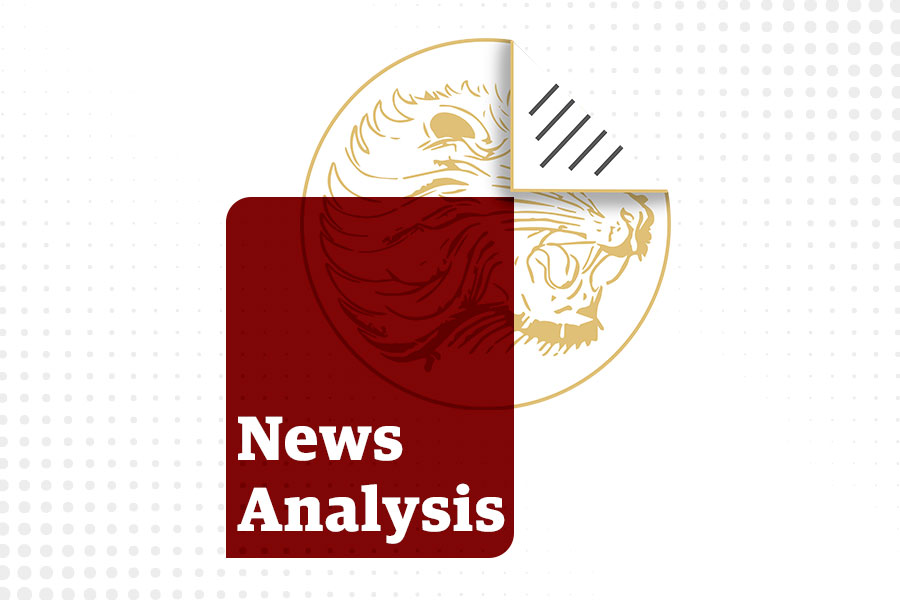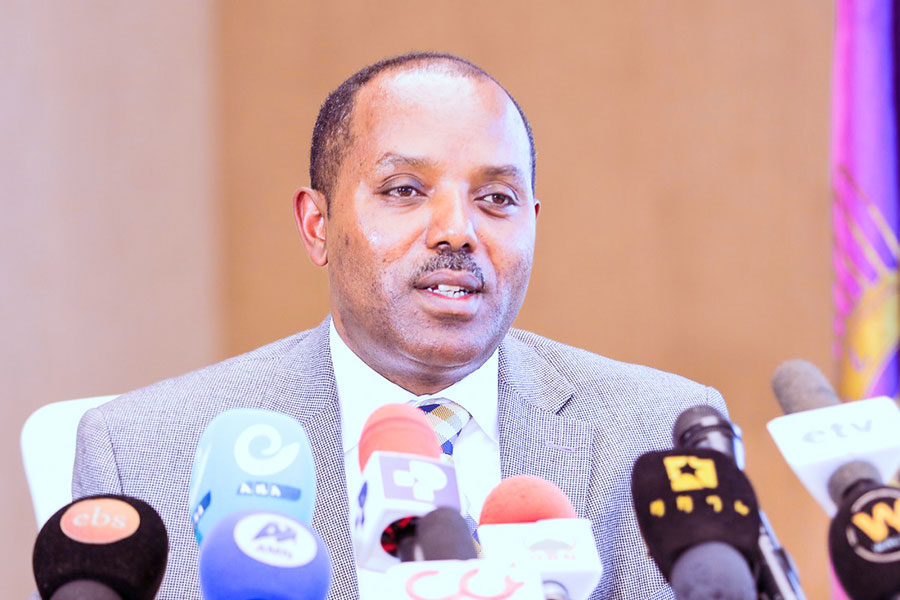
News Analysis | Mar 09,2024
ZamZam Bank S.C., the pioneering Islamic financial institution, has charted a course from turbulent financial waters to profitability, marking a significant turnaround in its operations. Revealed during a recent shareholder meeting at the Millennium Hall, company directors and executives spoke of the Bank’s resilience in the face of economic adversities and its strategic insight in navigating the unique landscape of Islamic banking.
Nasir Dino (PhD), chairman of the Board, and Melika Bedri, the Bank’s President, presented these upbeat financial results before thousands of shareholders, reflecting on the Bank’s journey since its inception. ZamZam Bank, which had weathered a loss of 145.42 million Br in its first year, has reversed its fortunes, posting a net profit of 24.1 million Br. The shift is primarily attributed to the Bank’s strategies for boosting its income through financing and investment activities.
ZamZam’s aggressive expansion strategy, encompassing the opening of 35 new branches within the year, played a crucial role in its financial turnaround. The expansion resulted in a significant increase in income from financing and investment activities, soaring to 337.57 million Br, up from 6.85 million Br in the previous year. According to company executives, this growth trajectory highlights the Bank’s robust approach to market penetration and customer reach.
Running the branch in Haji Ture Building at the heart of Merkato, which averages 14,000 customers annually, Yesun Taye attributed the increased earnings to expanding branches across the country.
"Businesspeople across the regional states have used our branches well," he told Fortune.
Nasir, a long-time proponent of Islamic banking in Ethiopia, emphasised the Bank’s success despite global and domestic economic challenges. He assured shareholders of prospective profit-sharing in the coming years, signalling confidence in ZamZam’s continued growth. Nasir unveiled plans for constructing ZamZam’s headquarters on a 4,135sqm plot in Addis Abeba financial district.
However, financial analysts like Abdulmenan Mohammed (PhD) caution about the rising operational cost, a byproduct of the Bank’s rapid expansion. He noted wages and benefits have tripled to 295.96 million Br, and general administration expenses more than doubled to 196.71 million Br, calling for strategic financial management to sustain the growth momentum in the forthcoming years.
Binyam Tesfaye, the executive assistant director for the President of the Bank, attributed the profit to prudent loan portfolio management, strategic marketing, and effective cost management, despite the complexities of a Sharia-compliant financial model.
"We have optimised our expense management," he told Fortune.
ZamZam’s total assets have witnessed a substantial increase of 137.3pc to 7.49 billion Br, indicating robust growth and a solid financial position. The Bank has also significantly increased its disbursement of interest-free financing, including profit receivable on Murabaha, reaching 4.34 billion Br, a fourfold increase from the previous year. The Mudarabah investment scheme, a profit-sharing arrangement with depositors instead of traditional interest, has dramatically increased to 8.07 million Br from 338,300 Br in the previous year.
Biniyam revealed that ZamZam Bank is crafting a road map for efficient capital deployment with an increased focus on customer acquisition and retention, investment diversification, loan portfolio expansion, and innovation in interest-free products.
With a significant Muslim population, Ethiopia offers an attractive market for Islamic banking, a sector that was untapped until the emergence of ZamZam Bank in 2021. ZamZam Bank, named after the Holy Spring in Mecca, commenced with a substantial initial capital base of 872 million Br paid-up and 1.68 billion Br subscribed. Over the year, its 13,000 shareholders have increased the paid-up capital by 26.9pc to 1.7 billion Br. The capital infusion, although significant, is still short of the minimum threshold set for 2026 by the National Bank of Ethiopia (NBE).
However, shareholders’ anticipation of profit sharing remains high, with optimism about the future of the Islamic banking industry. Nadim Abdulemed, one of the 11,200 founding shareholders retaining shares valued at 40 million Br, has expressed confidence in the Mudarabah investment scheme offered by ZamZam, describing it as a "rewarding investment."
Nadim recommends Bank executives focus on digital core banking and customer service, staying one step ahead of peers.
ZamZam is focused on digital core banking and customer service enhancement platforms. Melika, a notable figure in the Ethiopian banking industry, disclosed the development of an in-house mobile application and partnership with EthSwitch for interbank connectivity. Her leadership, marked by a tenure as the Chief Financial Officer at the state-owned Commercial Bank of Ethiopia (CBE), has been instrumental in navigating the Bank through its formative years.
The foray into Sharia-compliant banking has set a precedent for others in the industry, such as Hijira Bank, with ZamZam leading the way.
Its financial performance is noteworthy. Private banks’ average assets and liabilities were 62.9 billion Br and 50.5 billion Br, respectively, last year, indicating the scale of operations and trust from depositors. The net interest income averaged at 3.4 billion Br, with an average net profit close to 1.3 billion Br. The Return on Assets (RoA) and Return on Equity (RoE) averaged 2.36pc and 17.69pc, respectively, highlighting the efficiency of asset and equity usage in generating profits.
ZamZam’s liquidity measures were also promising, with cash and bank balances (20.5pc) representing a healthy share of its total assets and liabilities (26pc). Its capital adequacy ratio (CAR) stood at 35.6pc, signalling a substantial resource pool for future expansion in interest-free financing and investment activities. It has mobilised 4.98 billion Br in savings from 266,394 accounts, a 214pc jump, and its interest-free financing to saving ratio has surged to 87.15pc from 52.9pc from its inaugural year.
"It’s a remarkable improvement," said Abdulmenan.
PUBLISHED ON
Nov 11,2023 [ VOL
24 , NO
1228]

News Analysis | Mar 09,2024

Delicate Number | Mar 16,2024

Radar | Oct 14,2023

Fortune News | Feb 11,2023

Fortune News | Nov 03,2024

Fortune News | Jul 06,2019

Commentaries | Jun 14,2025

Fortune News | Mar 16,2024

Radar | Jul 17,2022

Sunday with Eden | Aug 13,2022

Dec 22 , 2024 . By TIZITA SHEWAFERAW
Charged with transforming colossal state-owned enterprises into modern and competitiv...

Aug 18 , 2024 . By AKSAH ITALO
Although predictable Yonas Zerihun's job in the ride-hailing service is not immune to...

Jul 28 , 2024 . By TIZITA SHEWAFERAW
Unhabitual, perhaps too many, Samuel Gebreyohannes, 38, used to occasionally enjoy a couple of beers at breakfast. However, he recently swit...

Jul 13 , 2024 . By AKSAH ITALO
Investors who rely on tractors, trucks, and field vehicles for commuting, transporting commodities, and f...

Jul 5 , 2025
Six years ago, Ethiopia was the darling of international liberal commentators. A year...

Jun 28 , 2025
Meseret Damtie, the assertive auditor general, has never been shy about naming names...

Jun 21 , 2025
A well-worn adage says, “Budget is not destiny, but it is direction.” Examining t...

Jun 14 , 2025
Yet again, the Horn of Africa is bracing for trouble. A region already frayed by wars...